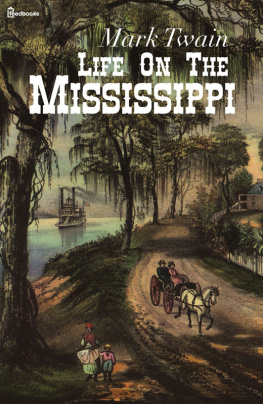Thomas Ruys Smith - Deep Water: The Mississippi River in the Age of Mark Twain
Here you can read online Thomas Ruys Smith - Deep Water: The Mississippi River in the Age of Mark Twain full text of the book (entire story) in english for free. Download pdf and epub, get meaning, cover and reviews about this ebook. year: 2019, publisher: LSU Press, genre: Detective and thriller. Description of the work, (preface) as well as reviews are available. Best literature library LitArk.com created for fans of good reading and offers a wide selection of genres:
Romance novel
Science fiction
Adventure
Detective
Science
History
Home and family
Prose
Art
Politics
Computer
Non-fiction
Religion
Business
Children
Humor
Choose a favorite category and find really read worthwhile books. Enjoy immersion in the world of imagination, feel the emotions of the characters or learn something new for yourself, make an fascinating discovery.

- Book:Deep Water: The Mississippi River in the Age of Mark Twain
- Author:
- Publisher:LSU Press
- Genre:
- Year:2019
- Rating:3 / 5
- Favourites:Add to favourites
- Your mark:
- 60
- 1
- 2
- 3
- 4
- 5
Deep Water: The Mississippi River in the Age of Mark Twain: summary, description and annotation
We offer to read an annotation, description, summary or preface (depends on what the author of the book "Deep Water: The Mississippi River in the Age of Mark Twain" wrote himself). If you haven't found the necessary information about the book — write in the comments, we will try to find it.
Deep Water: The Mississippi River in the Age of Mark Twain — read online for free the complete book (whole text) full work
Below is the text of the book, divided by pages. System saving the place of the last page read, allows you to conveniently read the book "Deep Water: The Mississippi River in the Age of Mark Twain" online for free, without having to search again every time where you left off. Put a bookmark, and you can go to the page where you finished reading at any time.
Font size:
Interval:
Bookmark:
D EEP W ATER
Southern Literary Studies
SCOTT ROMINE, SERIES EDITOR
DEEP WATER
The Mississippi River in the Age of Mark Twain
THOMAS RUYS SMITH

LOUISIANA STATE UNIVERSITY PRESS
BATON ROUGE
Published by Louisiana State University Press
Copyright 2019 by Louisiana State University Press
All rights reserved
Manufactured in the United States of America
First printing
DESIGNER: Michelle A. Neustrom
TYPEFACE: Whitman
PRINTER AND BINDER: Sheridan Books, Inc.
Portions of chapter 1 first appeared in The Mississippi Was a Virgin Field: Reconstructing the River before Mark Twain, 18651875, Mark Twain Journal, 53 (Fall 2015). Portions of chapter 4 and the epilogue first appeared in Roustabouts, Steamboats, and the Old Way to Dixie: The Mississippi River and the Southern Imaginary in the Early Twentieth Century, Southern Quarterly 52, no. 3 (Spring 2015): 1029.
LIBRARY OF CONGRESS CATALOGING-IN-PUBLICATION DATA
Names: Smith, Thomas Ruys, 1979 author.
Title: Deep water / Thomas Ruys Smith.
Description: Baton Rouge : Louisiana State University Press, [2020] | Includes bibliographical references and index.
Identifiers: LCCN 2019029979 (print) | LCCN 2019029980 (ebook) | ISBN 978-0-8071-7109-7 (cloth) | ISBN 978-0-8071-7286-5 (pdf) | ISBN 978-0-8071-7287-2 (epub)
Subjects: LCSH: Twain, Mark, 18351910Homes and hauntsMississippi River. | Twain, Mark, 18351910Criticism and interpretation. | River lifeMississippi River. | Mississippi RiverIn literature. | Mississippi River ValleySocial life and customs. | Mississippi RiverDescription and travel.
Classification: LCC PS1334 .S65 2020 (print) | LCC PS1334 (ebook) | DDC 813/.4dc23
LC record available at https://lccn.loc.gov/2019029979
LC ebook record available at https://lccn.loc.gov/2019029980
The paper in this book meets the guidelines for permanence and durability of the Committee on Production Guidelines for Book Longevity of the Council on Library Resources. 
For Tabitha and Delilah

Mark Twain and the Mississippi River are inseparable in my mind. When I told him that Life on the Mississippi was my favourite story of adventure [...] Mr. Clemenss manner changed. A sadness came into his voice. Those were glorious days, the days on the Mississippi. They will come back no more, life has swallowed them up, and youth will come no more. They were days when the tide of life was high, when the heart was full of the sparkling wine of romance. There have been no other days like them. ...
There he stoodour Mark Twain, our American, our humorist, the embodiment of our country. He seemed to have absorbed all America into himself. The great Mississippi River seemed forever flowing, flowing through his speech, through the shadowless white sands of thought. His voice seemed to say like the river, Why hurry? Eternity is long; the ocean can wait.
HELEN KELLER, Midstream, 1929

CONTENTS
ILLUSTRATIONS
D EEP W ATER
Introduction
THE MISSISSIPPI WAS A VIRGIN FIELD
The deep places in the river are not so obvious as the shallow ones
and can only be found by carefully probing it.
So perhaps it is with human nature.
HENRY DAVID THOREAU, Journal, 1859

The stream of our thought is like a river.
WILLIAM JAMES, ThePrinciplesofPsychology, 1890

No river of the world, great or small, is so wayward in its ways
as this wonderful stream. [...] He is never satisfied; always changing. Ever breaking away old boundaries, old landmarks, and making for himself new. In fact it seems that no landmark of his ever reaches the dignity of age. So soon as it has been sufficiently long established as to be called old, this grand old river of ours remorselessly demolishes it, and creates for himself new idols, in their turn to be broken and destroyed.
MAD FREAKS OF THE MISSISSIPPI,
Memphis OldFolksRecord, 1875
I n July 1895, near the start of his post-bankruptcy lecture tour around the world, Twain was holed up in a hotel room in Winnipeg, Manitoba, nursing a carbuncle. Already one of the most traveled Americans of his moment, he had a long journey ahead of himto Australia, New Zealand, India, South Africa. Still, as always for Twain, the Mississippi River was never very far away. A journalist for the WinnipegTribune was admitted to his room, and after some reminiscences about his early adventures, the reporter prompted the American writer to talk about the river: However excellent these European incidents may be [...] you doubtless consider the Mississippi your real field of work? You are, so to speak, the prophet of the Mississippi. Twains response was unequivocal: Yes, and the reason is plain. By a series of eventsaccidentsI was the only one who wrote about old times on the Mississippi. Wherever else I have been some better have been there before and will come after, but the Mississippi was a virgin field [...]. Here then was my chance, and I used it. Twain was, he felt, uniquely qualified to take the river as his real field of work. After all, he had been a steamboat pilot in his youth, more than thirty years ago now, and as far as Twain was concerned, no one could write that life but a pilot entered into the spirit of it. Yet most pilots did not run naturally to literature. They would have no connected style, no power of describing anythingjust an endless stream of details. Twain, though, was different. He, and only he, could tame the Mississippi in words.
Throughout his career, Mark Twain claimed the Mississippi River as his own. There were good reasons for that sense of ownership. By 1895 he had already completed a profoundly important sequence of river writings; though the Mississippi would never leave his imagination, he had made the enduring statements on the river that would stand as central pillars in his literary legacy. In very different moods, to very different ends, the Mississippi flowed through the heart of Old Times on the Mississippi (1875), TheAdventuresofTomSawyer (1876), LifeontheMississippi (1883), AdventuresofHuckleberryFinn (1884/5), and PuddnheadWilson (1894). The two decades at the heart of his life and writing career were dominated by shaping these interpretations of the river. Certainly for his contemporaries, to borrow Edwin Cadys words, Clemens owned the river.
Yet at the same time, the river was never his alone. While Twain wrote the defining portraits of the Mississippi in the nineteenth century, he was not, as he claimed in 1895, the only one who wrote about old times on the Mississippi. The Mississippi, to borrow Twains phrase ripe with images of conquest and desire, was not a virgin field. Walter Blair recognized many years ago that when Twain finally turned to the river in earnest, he had gravitated toward a popular subject, not pioneered a new one. Nor should we take Twain at his word when he claims that it was only a steamboat pilot entered into the spirit of it who could write about the river. Twain might have always privileged the view from the pilothouse, figuring it as a kind of panopticon, but the steamboat and the riverbank afford many vantage points from which to view the Mississippi, not all of them known to a pilot. Just as the river had already proved a fertile cultural symbol in the early decades of the nineteenth century, so, in the age of Mark Twain, did a wide variety of writers, artists, travelers, musicians, river workers, and engineers leave their mark on the Mississippi in manifold ways. At the same time that Twain was shaping and reshaping his imagined Mississippi, he was surrounded by others who were putting forward competing visions of the river and its ongoing significance for American life and identityin ways that chime with and challenge Twains narratives in equal measure. Long overshadowed by the image of Twains Mississippi, another river runs through this defining period in American culture. This river was a polyphonic place, not a monologue, composed of diverse voices each telling their own story of the Mississippi. For too long, Twains river has been read in a vacuum, not as part of a continuing conversation about the place of the Mississippi in Americas life and imagination. Framing his river books in this light gives us new landmarks by which to navigate them. In such company, Twains multivalent Mississippi begins to look rather different: no less distinctive or dominant and perhaps more singular than ever, but also part of a much wider miscellaneous and ambiguous chorus discussing the meaning of the river in American lifeand the meaning of American life on the riverat this crucible moment.
Next pageFont size:
Interval:
Bookmark:
Similar books «Deep Water: The Mississippi River in the Age of Mark Twain»
Look at similar books to Deep Water: The Mississippi River in the Age of Mark Twain. We have selected literature similar in name and meaning in the hope of providing readers with more options to find new, interesting, not yet read works.
Discussion, reviews of the book Deep Water: The Mississippi River in the Age of Mark Twain and just readers' own opinions. Leave your comments, write what you think about the work, its meaning or the main characters. Specify what exactly you liked and what you didn't like, and why you think so.








